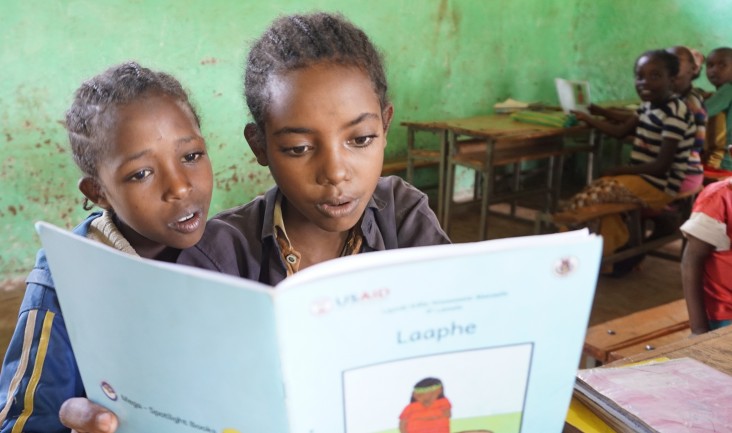
For Immediate Release
Sidama Zone, SNNPR, Ethiopia – The U.S. Agency for International Development (USAID), today joined the Ministry of Education in rolling out a comprehensive community outreach model designed to improve learning outcomes of children in grades one through eight. USAID’s READ Community Outreach activity will reach students in nearly 2,500 schools in the Amhara, Oromia, SNNP, Somali and Tigray regions. To date, nearly 1.5 million supplementary reading materials have been printed for distribution nationwide to these 2,500 school communities, promising to make learning more fun and engaging for students and teachers.
A growing body of evidence shows that children who do not learn to read in the first few grades are more likely to drop out and will permanently fall behind, first academically in school, and then eventually in terms of sustained household income. Addressing this risk, USAID is collaborating with the Ministry of Education and regional education bureaus throughout the country to improve access to millions of high-quality, grade appropriate supplementary reading materials, while supporting communities and schools in their efforts to improve learning. While reading is fundamental to academic achievement, it is also integral to creating well-functioning societies with informed citizens who are interested and able to participate in the resilience of their communities.
“Regional education bureaus can help strengthen local communities by ensuring that the best quality reading materials are provided to schools in their respective regions. They can also guide school and community leaders to select books that help develop the skills called for within the mother tongue curriculum,” said USAID Ethiopia representative Martin McLaughlin. “USAID is ready to support these processes by providing technical assistance, training and other support to Addis Ababa, Dire Dawa and all nine regions.”
USAID is producing these reading materials in seven languages initially (Afaan Oromoo, Af- Somali, Amharic, Tigrinya, Sidaamu Afoo, Wolyettatto Daanoo, and Hadiyyisa), and will distribute them directly to schools and communities. USAID and its partners will develop and print these materials in the most cost-effective ways possible, including through local authors and Ethiopian publishing houses and businesses. This includes using an open-source Creative Commons license, which allows others to distribute, remix, and build upon many of these materials free of charge. The Creative Commons license is quickly becoming the norm worldwide, and USAID and the Ministry of Education are leading on this initiative in Africa.
Save the Children is implementing the USAID activity in partnership with the Ministry of Education and regional education bureaus, and in collaboration with several local non-governmental organizations including Amhara Development Association, Adult and Non Formal Education Association in Ethiopia, the Organization for Welfare and Development in Action, and the Tigray Development Association.
The READ Community Outreach activity is an integral part of USAID’s comprehensive Reading for Ethiopia’s Achievement Developed project, which aims to build strong local communities and increase the reading skills of 15 million children nationwide.
See also
USAID Ethiopia Education







Comment
Make a general inquiry or suggest an improvement.